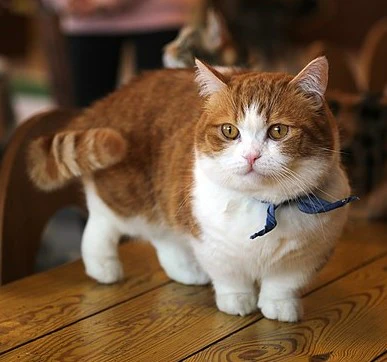 Munchkin cats have this special charm, thanks to their short legs and playful demeanor. Originating somewhere around a couple of decades ago, these little guys have made quite the name for themselves in the world of cats.
Munchkin cats have this special charm, thanks to their short legs and playful demeanor. Originating somewhere around a couple of decades ago, these little guys have made quite the name for themselves in the world of cats.
So, where do they come from? Back in the early ’80s, a couple of these stumpy-legged wonders were spotted in Louisiana. Fast forward and now they’re a recognized breed with quite the fan base. Named after the little people in ‘The Wizard of Oz’, the Munchkins certainly walk—or should I say waddle—their own way.
You might wonder why they’re so popular. It’s not just about those legs. These cats are famous for being affectionate and cute, with personalities as vibrant as their looks. Whether you see them playfully batting at toys or lounging adorably in the sun, they’re sure to melt your heart.
And yes, they’re recognized globally. While some traditionalists in the cat community might have their hesitations, Munchkin cats keep winning people over with their unique charm and plenty of online buzz.
The Birth of Their Short Legs: Munchkin Cats’ Genetics
The secret behind those adorable short legs lies in a genetic mutation. This mutation throws a little twist in the bone growth, which leads to the iconic short stature of Munchkin cats. Just like how humans get blue eyes or curly hair from their genes, Munchkins wear their short legs with pride thanks to their DNA.
Now, let’s tackle some myths. There’s a common belief that these cats are burdened with health problems due to their leg length, but that’s not really the case. While they might have some challenges climbing stairs like their long-legged pals, Munchkin cats generally enjoy good health and lead active lives.
Breeders play a crucial role in maintaining the well-being of these cats. Responsible breeding practices ensure that Munchkin cats enjoy good health, avoiding potential genetic pitfalls. Breeders often match cats carefully to prevent any health issues that could arise from inbreeding or improper genetic pairings.
Experts, including veterinarians and breeders, shed light on Munchkin genetics. They emphasize the importance of observing ethical practices while breeding them. This responsible handling ensures that Munchkins not only maintain their unique look but also live healthy, happy lives exploring their world.
Living with a Munchkin Cat: Characteristics and Care Tips
Munchkin cats are known for their playful and sociable nature. These little guys love interacting with people and tend to have an independent streak, just enough to keep things interesting. They’re curious explorers, often seen investigating every nook and cranny, making their presence known in the most entertaining ways.
Caring for a Munchkin cat involves some basics that every cat owner usually gets acquainted with. Think of feeding them a balanced diet, which is key to keeping them healthy. And don’t forget grooming—yes, even the shorties need their regular brush session to keep those coats in top condition.
Creating a home that keeps these cats entertained is part of the fun. Give them toys and spaces where they can scramble around safely. You’ll find that they enjoy a bit of a cat jungle gym setup, even with their shorter legs. It’s all about encouraging them to enjoy their agility and playful nature.
Hearing from Munchkin cat owners, they’ve got stories to tell. Many speak fondly of their cats’ loving companionship and quirky antics. These personal tales reveal how Munchkin cats bring heaps of joy and laughter into their homes, making them a popular choice among cat lovers.
Are Munchkin Cats the Right Pet for You?
Deciding on bringing a Munchkin cat into your life involves weighing a few factors. These energetic creatures bring a lot of joy, but it’s also about understanding their needs and fitting them into your day-to-day. Are you ready to meet the playful and social demands of a Munchkin? If so, you’re in for a treat with these fantastic felines.
Munchkin cats typically don’t cause unusual allergy issues, yet it’s always smart to check how your household might react. Some folks are more sensitive to cat dander, and knowing this beforehand helps in making the right call.
Owning a cat is a long-term commitment. Munchkins, like all pets, need your love and care, from regular vet visits to playtime. The effort is well worth it, considering the companionship and happiness they bring into your home.
And if you find yourself becoming a Munchkin aficionado, there’s a whole community out there to support you. Online forums and local cat groups are great for sharing experiences, getting tips, and connecting with fellow Munchkin lovers who share your passion for these delightful cats.
Munchkin cats are such a unique breed! I think their short legs give them an adorable, playful look, but I’ve always wondered about the long-term impact on their mobility and health. It’s great to see awareness to both their cuteness and their care needs. Do you think Munchkins are better suited for indoor-only lifestyles because of their build?
Hello Marlinda. I agree with you these cats are so cute good natured and playful to make them more suited for the indoors. Munchkin cats with proper care can live a long quality life of 12 to 15 years.